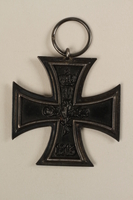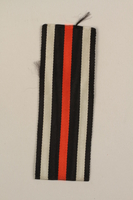Overview
- Brief Narrative
- Ribbon bar which belonged to Salli Joseph probably awarded for his service in the German Army during World War I, 1914-1918. Salli and his family lived in Berlin, Germany, and he began searching for ways to get his family out of the country after the establishment of the Nazi dictatorship in 1933. They tried to get visas for the United States, since his wife's sister had lived there for some time. However, Salli and his wife, Martha, were placed on the very restrictive Polish quota system by the US because they were born in West Prussia. In 1939, they sent their 19 year old son, Bernard, to England and in 1940, their 16 year old daughter, Margot, to Palestine. Salli and Martha were deported to Auschwitz concentration camp on March 6, 1943, where they were killed shortly after arrival.
- Date
-
commemoration:
1914-1918
- Geography
-
issue:
Germany
- Credit Line
- United States Holocaust Memorial Museum Collection, Gift of Margot Hamburger
- Contributor
-
Subject:
Margot Hamburger
Subject: Salli Joseph
- Biography
-
Margot Joseph was born on March 24, 1924, in Berlin, Germany to Salli and Martha Danziger Joseph. She had one older brother, Bernard, born on November 1, 1920. Salli was a decorated World War I German soldier, who married Martha shortly after that war and settled in Berlin where Martha’s family lived. Salli and Martha ran a piecework tailoring business in their home. The family was liberal in their Jewish beliefs. Margot attended the public schools until 1934, when her father removed her due to the teaching of Nazi policies following the establishment of the Nazi dictatorship in 1933. She was sent to the Jewish school, where she learned Hebrew, as well as Jewish history. During these years, Margot became a Zionist, and she began to dream of going to Palestine. Salli and Martha were against it at first, but after the Kristallnacht pogrom in November 1938, they allowed Margot to join Youth Aliyah. Youth Aliyah was formed in 1933 to rescue Jewish children from Nazi Germany, and prepare them for life in farming communes in Palestine. Margot joined in 1939 and was sent to a hakhshara (training camp) in the German countryside to learn the skills that would be needed on a kibbutz in Palestine.
Her brother, Bernard, got a work permit for England and left Germany in 1939. Margot received permission from the British government to go to Palestine in March 1940. On March 25, she said goodbye to her parents and took a train to Trieste, Italy, where she boarded a boat, the Marco Polo, to Haifa, reaching port on April 4, 1940. She was assigned to a kibbutz called Ramat David, where she stayed for about 2 ½ years. While she was in the kibbutz Margot was given the Jewish name of Yehudit, which she went by while living at the kibbutz.
She was able to keep in contact with her parents through relatives in the United States and with the help of the International Red Cross. In October 1943, she learned from an aunt in the United States that her parents had been deported to Auschwitz concentration camp. Though their fate was not known, Margot felt sure that they had been killed. After the war ended, she would learn that they had been killed in March 1943, soon after their arrival at the camp.
In 1950, Margot married Egon Hamburger. They had two children. Her brother, Bernard, had emigrated from Great Britain to the United States after the war. He urged Margot to move there with her family and they did so in 1954. Egon died of a heart attack in 1968, age 55 years.
Salli Joseph was born November 30, 1889, in Neuenburg, Germany. He served in the German Army during World War I (1914-1918) and was awarded an Iron Cross. Shortly after that war, he married Martha Danziger and they had two children, Bernard, born November 1, 1920, and Margot, born March 24, 1924. Salli and Martha set up a small tailoring business in their home sewing women’s undergarments for various companies for which they were paid by the piece. The family was liberal in their Jewish beliefs. In 1934, Salli pulled Margot out of the public school and sent her to a Jewish elementary school, due to the increasing Nazi indoctrination of children at German public schools following Hitler’s appointment as Chancellor in 1933. Salli wanted to immigrate to Shanghai; however Martha refused to leave her family, so the family stayed in Berlin. After the Kristallnacht pogrom in November 1938, Salli and Martha began to look for ways to get out of Germany.
One of Martha’s sisters had immigrated to the United States years earlier, and they attempted to get an affidavit from her so that the family could be put on the quota system for the United States. Both Salli and Martha had been born in West Prussia, and that placed them under the Polish quota system according to United States law. It was extremely hard to get a number with the Polish quota. They decided to send Bernard to Great Britain in 1939 as he was able to get a work visa; they allowed Margot to join Youth Aliyah, which would send her to Palestine on March 25, 1940.
Salli and Martha were able to keep in contact with their children through relatives in the United States and, later, through the Red Cross, but they never saw them again. In one final letter to Martha’s relatives in the United States in 1943, Salli informed the family that they were being sent to a concentration camp. On March 6, 1943, they were sent by transport to Auschwitz concentration camp, where they were killed shortly after their arrival. Salli’s prisoner number was 107232, he was 57 years old.
Physical Details
- Classification
-
Military Insignia
- Category
-
Medals
- Object Type
-
Medals, German (lcsh)
- Physical Description
- Rectangular, gold-colored metal bar covered with cloth ribbon with 11 vertical stripes: dark blue, white, light blue, dark blue, red, dark blue, white, light blue, white, dark blue. The seams are sewn with thin white thread. The ribbon folds over the metal bar and the edges are joined on the back by loosely hand stitched light brown thread. Attached to back is a straight clasp pin.
- Dimensions
- overall: Height: 0.380 inches (0.965 cm) | Width: 1.620 inches (4.115 cm) | Depth: 0.250 inches (0.635 cm)
- Materials
- overall : metal, cloth, thread
Rights & Restrictions
- Conditions on Access
- No restrictions on access
- Conditions on Use
- No restrictions on use
Keywords & Subjects
Administrative Notes
- Legal Status
- Permanent Collection
- Provenance
- The bar ribbon was donated to the United States Holocaust Memorial Museum in 2005 by Margot Hamburger, the daughter of Salli Joseph.
- Record last modified:
- 2023-08-31 14:51:09
- This page:
- https://collections.ushmm.org/search/catalog/irn523240
Download & Licensing
In-Person Research
- By Appointment
- Request 21 Days in Advance of Visit
- Plan a Research Visit
- Request to See This Object
Contact Us
Also in Margot Hamburger family collection
The collection consists of three World War I medals and documents relating to the experiences of Margot Joseph, her parents Salli and Martha Danziger Joseph, and her brother Bernard in Germany and Palestine before, during, and after World War II. Some of these materials may be combined into a single collection in the future.
Date: 1914-1953

World War I Iron Cross medal that belonged to a Jewish veteran and concentration camp inmate
Object
Medal awarded to Salli Joseph for his service in the German Army during World War I, 1914-1918. Salli and his family lived in Berlin, Germany, and he began searching for ways to get his family out of the country after the establishment of the Nazi dictatorship in 1933. They tried to get visas for the United States, since his wife's sister had lived there for some time. However, Salli and his wife, Martha, were placed on the very restrictive Polish quota system by the US because they were born in West Prussia. In 1939, they sent their 19 year old son, Bernard, to England and in 1940, their 16 year old daughter, Margot, to Palestine. Salli and Martha were deported to Auschwitz concentration camp on March 6, 1943, where they were killed shortly after arrival.

WWI German military black and white striped ribbon that belonged to a Jewish veteran and concentration camp inmate
Object
Ribbon which belonged to Salli Joseph, probably awarded for his service in the German Army during World War I, 1914-1918. Salli and his family lived in Berlin, Germany, and he began searching for ways to get his family out of the country after the establishment of the Nazi dictatorship in 1933. They tried to get visas for the United States, since his wife's sister had lived there for some time. However, Salli and his wife, Martha, were placed on the very restrictive Polish quota system by the US because they were born in West Prussia. In 1939, they sent their 19 year old son, Bernard, to England and in 1940, their 16 year old daughter, Margot, to Palestine. Salli and Martha were deported to Auschwitz concentration camp on March 6, 1943, where they were killed shortly after arrival.
Joseph family papers
Document
The collection documents the Holocaust experiences of the Joseph family of Berlin, Germany. Included is wartime correspondence of Margot Hamburger (née Joseph) and her brother Bernard Joseph, both of whom emigrated from Berlin by 1940, and their parents Salli and Martha Joseph in Berlin. Other materials include identification papers, documents related to Margot and her husband Egon Hamburger’s time in Palestine, documents related to Bernard’s internment in Australia, and family photographs from Berlin and Palestine.
Margot Hamburger papers
Document
The papers consist of nine letters between Eka Rozenkranz in Cyprus to Margot Joseph [donor] in Israel between February 1947 and May 1947. Also included are three photographs of images of Bernard Joseph [donor's brother] at the ORT school in Berlin, Germany, dated 1938-1939, and three photographs of images of Margot Joseph in Palestine, dated 1944-1949.
Margot Hamburger photographs
Document
Consists of two photographs that show Margot Hamburger with family members in 1939 and 1940. One image shows her with brother Bernard Joseph in Berlin, Germany in 1939 before Bernard's departure for England. The second image of Margot with her parents, Salli and Martha, dated March 24, 1940, her 16th birthday, in Berlin, Germany and the day before she left for Palestine.



